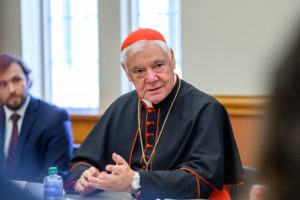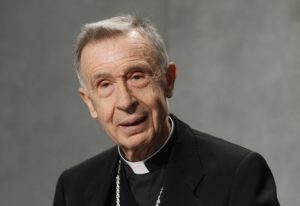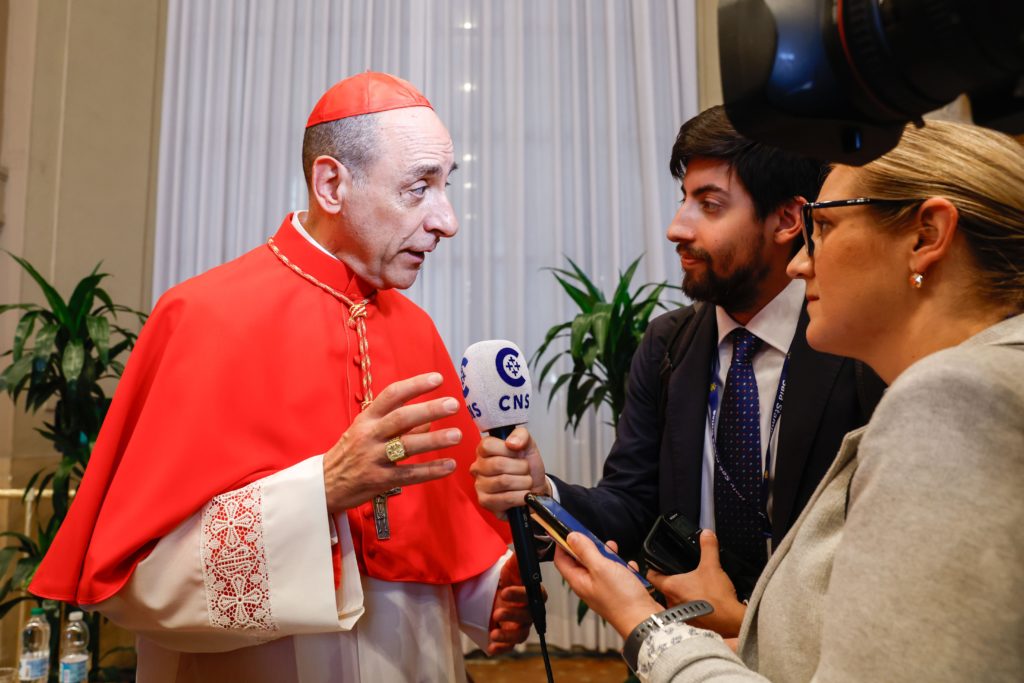ROME — Once upon a time, being pope meant never having to say you’re sorry. St. John Paul II shattered that precedent, apologizing more than 100 times over the course of his papacy for past sins of the Church, including a massive “Day of Pardon” ceremony in St. Peter’s Square during the Great Jubilee Year of 2000.
More recently, being pope has meant never having to explain yourself, at least to your most determined critics.
Famously, Pope Francis received a set of five “dubia,” or theological doubts, from four conservative cardinals, including American Cardinal Raymond Burke, in 2016, regarding his controversial document “Amoris Laetitia” (“The Joy of Love”), which appeared to open a cautious door to reception of Communion by divorced and civilly remarried Catholics.
For almost seven years the pontiff never directly responded to those “dubia,” preferring to allow others to do so in his name. Occasionally, he would appear to endorse one or another reply, but always in a way that never directly left his fingerprints on the content. In an interview the same year, the pope said he doesn’t “lose any sleep” over the reactions of his critics, seemingly ratifying the principle of the nonanswer.
Yet of late, it almost seems the Vatican under Francis can’t see “dubia” anymore; it doesn’t want to answer right away.
To begin with, another group of conservative cardinals, also including Burke, submitted a new set of “dubia” to Francis in July, ahead of his Oct. 4-29 Synod of Bishops on Synodality, and announced that they actually received a response the very next day — which, let’s face it, sets a new standard of rapid response for an institution whose usual modus operandi is, “Talk to me on Wednesday, and I’ll get back to you in 300 years.”
However, the cardinals declared that since the pope’s responses didn’t follow the traditional yes-or-no format in such matters, they reformulated the “dubia” and resubmitted them in late August. They concerned several matters, including the perennially contentious issues of the blessing of same-sex unions and the ordination of women clergy.

On Oct. 2, just before the curtain went up on the synod, the Vatican’s Dicastery for the Doctrine of the Faith published the pope’s replies, which appeared to boil down to a cautious yes on the blessings issue, as long as it doesn’t court confusion with the sacrament of marriage, and a basic no to women clergy, while allowing that it can be the object of further study.
Not only did doing so break with the practice from 2016, but it also stunned some observers that Francis essentially took those issues off the table during the synod, whose members had been preparing to discuss them for 2 1/2 years.
The very next day, the dicastery released another response to a set of “dubia” submitted by Cardinal Dominik Duka of the Czech Republic, regarding Communion for the divorced and remarried. In this case, the responses came not from the pope but from Argentine Cardinal Victor Manuel Fernández, the new head of the Vatican’s doctrinal office.
In case there was any doubt about the face value reading of the pope’s original ruling, Fernandez was clear: “The apostolic exhortation ‘Amoris Laetitia’ of Francis opens the possibility of access to the sacraments of reconciliation and the Eucharist when, in a given case, there are limitations that accentuate responsibility and guilt.”
More recently, the dicastery also published this week a set of responses to six “dubia” submitted by a bishop in Brazil regarding the eligibility of transsexuals for various acts in the Church, including baptism, serving as godparents, having their own children baptized, and acting as witnesses to a church wedding.
In every case, the replies given both by Francis and Fernández amount to another cautious yes, though always with the proviso that allowing transsexuals to play these roles must not create “public scandal” or “disorientation among the faithful.”
Exactly what might constitute either of those conditions was not spelled out in the response, leaving a great deal, in the eyes of most observers, up to the discretion of local pastors and bishops.
The basic question all this raises is: After a long span in which “dubia” basically ended up in the Vatican’s dead letter office, why now are they responding with such alacrity?

Three answers suggest themselves.
First, with Fernández in the Holy Office, Francis likely feels a higher degree of certainty that the answers it may give to nettlesome questions will reflect his own outlook. First under German Cardinal Gerhard Müller, and then under Spanish Cardinal (and fellow Jesuit) Luis Ladaria, the pope may not have felt the same absolute confidence.
Second, the answers that are now on the record are classics of the Francis approach to contested issues: At least at face value, they don’t change Church teaching, but they do clearly encourage moderates and progressives seeking the most generous possible interpretation of that teaching.
Perhaps it’s simply that since 2016, Francis has become more confident in that approach, and thus less hesitant about saying so out loud.
Third, there’s also the fact that Francis will turn 87 next month, and that since his discretion in 2016, he’s been hospitalized three times and undergone two surgeries. He’s already the oldest reigning pope in the Catholic Church since 1903, and anyone in his position would have to hear time’s winged chariot hurrying near.
In that light, perhaps he’s simply less willing to allow difficult questions to dangle, feeling that if he truly wants to cement his legacy, now is the time.
However one explains it, the fact of the matter seems clear. For bishops across the Catholic world, the new rule of thumb has to be, if you don’t want the answer, don’t ask the question — because odds now are, an answer is precisely what you’re going to get.

